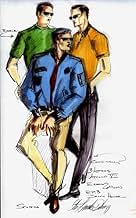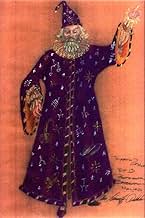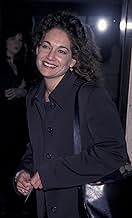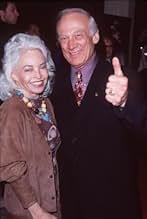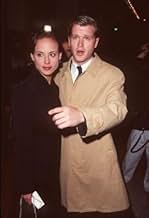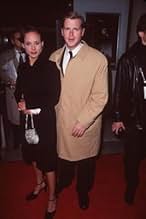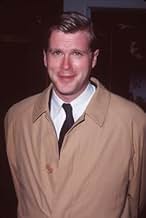Dramatización de la misión espacial tripulada Apollo.Dramatización de la misión espacial tripulada Apollo.Dramatización de la misión espacial tripulada Apollo.
- Ganó 3 premios Primetime Emmy
- 22 premios y 33 nominaciones en total
Argumento
¿Sabías que...?
- CuriosidadesThe lunar excursion module (LEM) seen in several episodes up close, is in fact a real lunar module. It was originally scheduled to go to the Moon as part of the Apollo 18 flight; NASA budget cuts forced Apollo 18's cancellation, but the LEM was saved and eventually used in filming this miniseries. It is now enshrined in a museum. In some episodes, we can see a bus-like craft which takes the astronauts from NASA down to the pad at Cape Kennedy just prior to launch. This bus is also the real thing, which the real astronauts all used.
- PifiasIn the first episode there is a scene that shows a Navy ship, the ship shown is a Ticonderoga class cruiser, the Navy commissioned the first one, the USS Ticonderoga (CG 47), on Jan. 22, 1983.
- Citas
Clinton Anderson: [at the senate inquiry following the Apollo 1 fire] Colonel, what caused the fire? I'm not talking about wires and oxygen. It seems that some people think that NASA pressured North American to meet unrealistic and arbitrary deadlines and that in turn North American allowed safety to be compromised.
Frank Borman: I won't deny there's been pressure to meet deadlines, but safety has never been intentionally compromised.
Clinton Anderson: Then what caused the fire?
Frank Borman: A failure of imagination. We've always known there was the possibility of fire in a spacecraft. But the fear was that it would happen in space, when you're 180 miles from terra firma and the nearest fire station. That was the worry. No one ever imagined it could happen on the ground. If anyone had thought of it, the test would've been classified as hazardous. But it wasn't. We just didn't think of it. Now who's fault is that? Well, it's North American's fault. It's NASA's fault. It's the fault of every person who ever worked on Apollo. It's my fault. I didn't think the test was hazardous. No one did. I wish to God we had.
- Versiones alternativasFor the DVD release, the series was cropped slightly at the top and bottom of the frame. This was done to create a presentation that would be enhanced for viewing on widescreen television sets.
- ConexionesEdited into Race for Space (2010)
Coincidently, Apollo 11 landed exactly 35 years ago today. I was 13 years old at the time and living in Nova Scotia, Canada. The 'Eagle' touched down at 5:17 pm, much to the consternation of my mother who was busy trying to prepare supper. Just like Tom Hanks would later relate, I had my models of the Command Service Module, Lunar Module and Saturn V rocket close at hand while I had claimed the living room armchair for the occasion. My family gathered around our old B&W television which was tuned to the Canadian Broadcasting Corporation (CBC), one of only two stations which were available to us back then. Much of the CBC's coverage consisted of a feed from CBS, so we got to watch Walter Cronkite's famous 'Oh Boy!' commentary. My prized 3" reel-to-reel tape recorder (you could get all of 1 hour on a single reel) was busy taping a local radio station carrying NBC's coverage with Jay Barbree.
The entire family congregated again a few hours later for the moonwalk, just before midnight, and watched Neil & Buzz's first steps. I stayed up for the entire 30 hour televised stretch, from lunar landing to liftoff, stealing a moment every now and then to go outside and gaze up in wonder at the moon, filled with awe that two human beings were actually there, living and working on its surface. In this day of CNN and other all-news networks, it should be remembered that the coverage of this event was in itself history in-the-making - TV's longest continuous coverage of a planned event.
My interest in space began with the flight of Apollo 8. When I heard that this was the first manned launch of the world's biggest rocket, the Saturn V, I was sure that one of its million parts would go wrong with disastrous results. Thank God it didn't. I watched and I was forever hooked. A real space junkie, religiously watching each mission after that, coaxing my Mom to let me stay home from school (recurrent cases of 'moon sickness', no doubt), clipping out every newspaper, Life, Time or Newsweek article I could find (now faded yellow with age) and trying to tape as much of the audio coverage as I could (few private individuals could afford a video recorder back then). By Apollo 14, I had earned enough money working at a grocery store to buy a 4-track 7" reel-to-reel recorder (which allowed one to put up to 12 hours on a single tape!) and had built a 15" Heathkit color TV. For Apollo 16, I had added a new-generation 'cassette' recorder to my arsenal (don't forget that the venerable 8-track was still popular at the time). And, of course, I had acquired a VCR by the time the first Space Shuttle flew in 1981. It has always annoyed me that the more recording resources I could afford, the less TV & radio coverage there was available to tape.
But the effect of the Apollo program on me was profound. Because of it, I entered into a career in radio astronomy, enjoying the technical challenge of building instruments to investigate deep space from the Earth, perhaps recognizing the likelihood that I would never have to opportunity to leave its surface (although I did make the first cut for the Canadian Astronaut Program nearly 20 years ago). In tribute to Project Apollo, we named our son (now 16) after astronaut David Scott who commanded Apollo 15, my favorite of all the lunar flights.
In many ways, I feel sorry for the children of today - they will never experience the monumental awe and global celebration that we were privileged to witness back in 1969. Strange, isn't it, that although Apollo - the pinnacle of mankind's technical achievement - which occurred only 35 years ago is now looked on as though it was something out of our deep past rather than a part of our future. It's almost treated like it was a chapter out of ancient history, similar to other great accomplishments like the building of the Pyramids or the Great Wall. Although it might not seem so today, 500 years from now the moon landings will undoubtedly be remembered as the most significant event to have occurred in the 20th century.
It's hard to choose my favorite E2M episode since they were all so good. As an engineer, 'Spider' resonated well with me, portraying the passion and dedication which many of us put into our work, albeit for projects with a much lower profile. 'That's All There Is' brought back fond memories of the Apollo 12 mission. I distinctly remember there was talk at the time that astronauts Conrad and Bean may have been on an accidental oxygen high. It's good to know that there effervescent behavior on the surface was just a manifestation of their normal high spirits and comradely. I was delighted at how 'Galileo Was Right' was able to present the training of the astronauts to be field-geologists in such an entertaining and informative manner. And finally, the bittersweet "Le Voyage Dans La Lune" brought a tear to my eye, just as happened back in 1972 when I watched Apollo 17 and the last lunar module lift-off from the moon. It's even sadder still, that we have not returned, nor will we for perhaps another 20 years.
- rhayward-2
- 19 jul 2004
- Enlace permanente
Selecciones populares
- How many seasons does From the Earth to the Moon have?Con tecnología de Alexa
Detalles
- Fecha de lanzamiento
- País de origen
- Idioma
- Títulos en diferentes países
- From the Earth to the Moon
- Localizaciones del rodaje
- Empresas productoras
- Ver más compañías en los créditos en IMDbPro
- Duración53 minutos
- Color
- Mezcla de sonido
- Relación de aspecto
- 1.78 : 1
Contribuir a esta página




